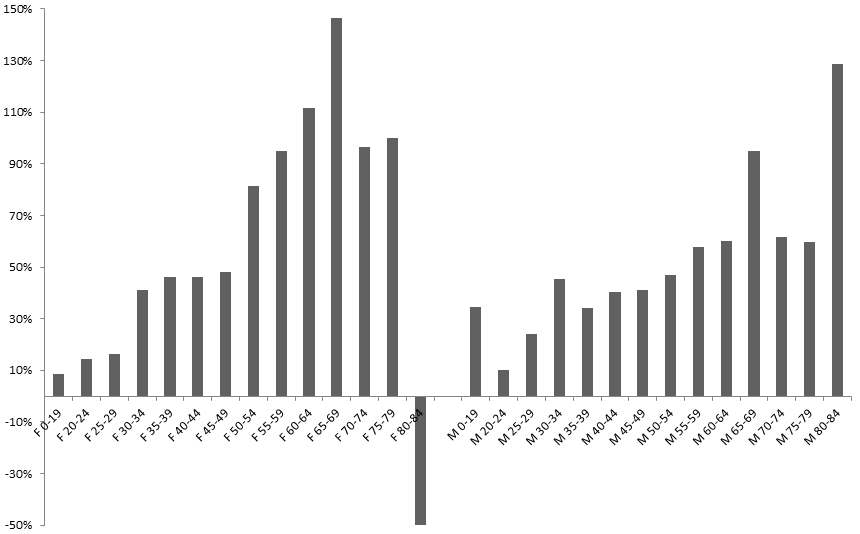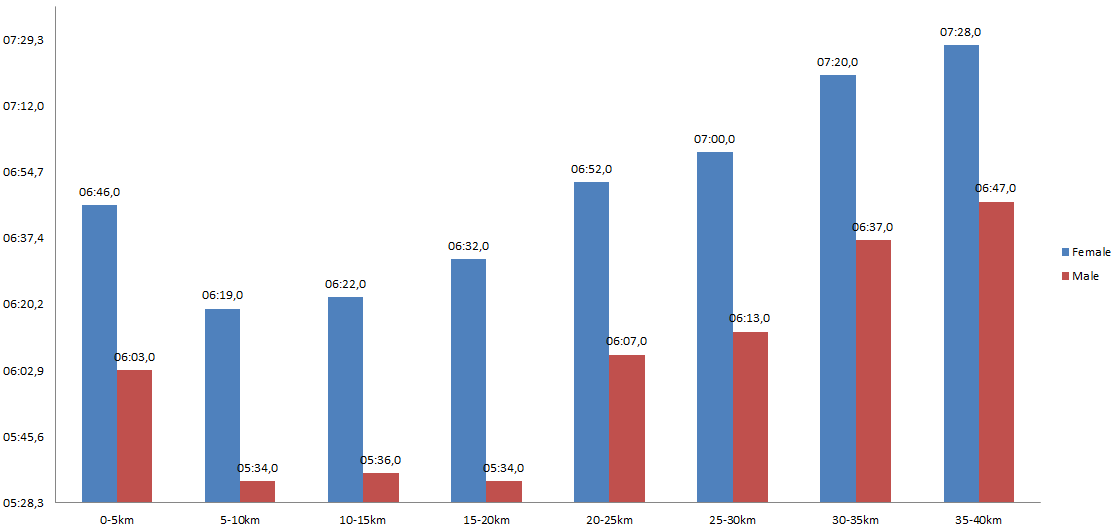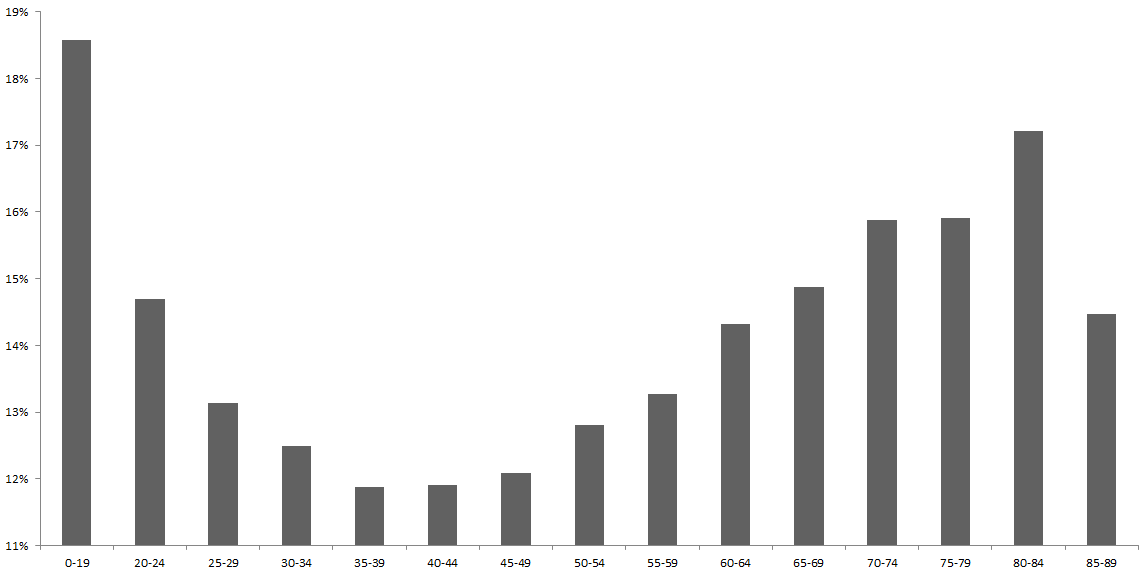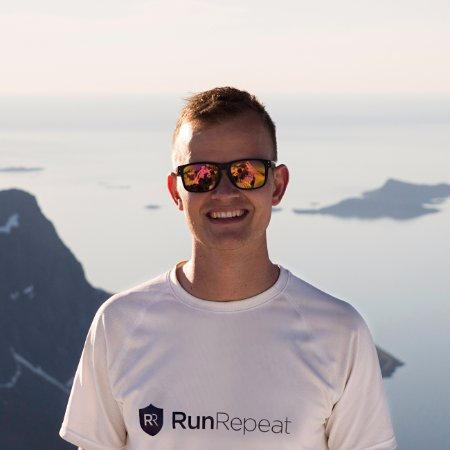Research: Women Are Better Runners Than Men
Danish research have revealed intriguing results from the most exhaustive study of marathon results in history. The study included 1.815.091 marathon results from 131 marathons. The new research concludes that women are 18.61% better than men at running with a controlled and consistent pace when comparing results for the first and the last part of the marathon. The research also suggest that both men and women burn out significantly and could improve their marathon results significantly simply by starting out slower. Here you will find all information about the research. If mentioning the research, please refer to these compiled results for enthusiastic readers to dig deeper into the analysis.
Purpose of The Study
The purpose of this study was to analyze the performance in marathon results and address potential sex differences. Further the purpose was to illuminate marathon runners about potential improved performance by changing pacing strategies. It has been important to the researchers to show statistically significant results. All results are based on huge collections of marathon results and are all concluded with 99,9% certainty or above.
Methods and Programs Used Analyzing Data
Data includes 1.815.091 results from 131 world wide marathon races from 2008 to 2014. All information was standardized to perform the statistical analysis. Each runner was categorized by sex, age, country, rank, split results, final result and year of the performance. Outliers were excluded in the analysis. Of the 1.815.091 participants, 1.423.160 had sex given and 422.003 participants had their specific age given.
Results From The Analysis
This section is split into separate sections address each category of results.
Distribution and changes in sex proportions
Among the 1.815.091 results 1.423.160 had sex given. 974.599 (68,48%) were men and 448.561 (31,52%) were women. Looking at the last 5 years distribution the growth in marathon finishers has been 54,29% higher for women than men. In actual numbers men's participation has increased from 136.846 to 166.422 (21,61%) while the numbers for women increased from 59.073 to 78.771 participants (33,35%). If this development continues it is a matter of time till we can expect more women than men running marathons. By splitting sex into age groups it becomes clear how it in particular is in the age groups from 50 years and above where women are having a much steeper growth than men. For 50+ years the growth for women is 89,70% while it for men in the same age group is 54,56%. Comparing the age group increase split by sex we see how the growth in participants in particular is driven by the age groups 50-54, 55-59, 60-64, 65-69, 70-74, 75-79. Please note that age group 80-84 for both sex have few participants and data are therefore not accurate. We suggest not to analyze too much in those numbers. 
Pacing differences in sex
Looking at elite runners will reveal how they pace the second part of the marathon as close as possible to the first half. It will physiologically be optimal to run at an even pace, though many parameters might influence this in a negative way (pride, testosterone, missing capability to understand own fitness level, risk loving, mood etc.) Analyzing 612.724 results reveals how men are 18,61% less good at keeping an even pace at the first and second part of the marathon.  To make the results even more specific we looked at the pace for each 5 km and each 10 km too. The pattern was true, suggesting men are slowing down 16,96-27,27% more than women depending on how you measure the slow down. Further it was clear that the first 5 kilometers typically are completed at a significantly slower pace than 5-10 km. A potential explanation is the early race traffic, which limits many runners. A challenge many races experience. Overall men finish in an average time of 04:21:36 while women finishes in 04:41:27. Men are 7% faster than women. For men the fastest age is 38 years old while it for women is 24 years old.
To make the results even more specific we looked at the pace for each 5 km and each 10 km too. The pattern was true, suggesting men are slowing down 16,96-27,27% more than women depending on how you measure the slow down. Further it was clear that the first 5 kilometers typically are completed at a significantly slower pace than 5-10 km. A potential explanation is the early race traffic, which limits many runners. A challenge many races experience. Overall men finish in an average time of 04:21:36 while women finishes in 04:41:27. Men are 7% faster than women. For men the fastest age is 38 years old while it for women is 24 years old.  The purpose of this study was not to look at the performance of age groups in particular, all though the research clearly shows how age groups 35-39 and 40-44 years old are the best pacers, while 0-19 and +70 years old runners burn out dramatically. In fact the age group 0-19 years burn out 55,91% more than runners in the age group 35-44 years old.
The purpose of this study was not to look at the performance of age groups in particular, all though the research clearly shows how age groups 35-39 and 40-44 years old are the best pacers, while 0-19 and +70 years old runners burn out dramatically. In fact the age group 0-19 years burn out 55,91% more than runners in the age group 35-44 years old. 
Conclusions
- The increase in the number of participants is 54,29% higher for women as compared to men. The interest for marathon races is increasing across both genders and all age groups, but especially women aged +50 years are increasingly participating in marathon races.
- All though men are faster marathon runners than women (due to genetics) they are not the smartest. Women are 18,61% better at pacing.
- The age group 0-19 years burn out 55,91% more on the 2nd part of the marathon compared to the age groups 35-39 and 40-44 years.
Final Thoughts on Improving Your Marathon Result
Jens Jakob Andersen, the lead guy behind this research used to be a competitive runner and gives 5 important guidelines to improve your marathon result:
- Start out slower than what feels natural
- Do not get excited by the crowd
- Race your own race and don't compete with others
- If you cannot keep your planned pace, slow down immediately instead of killing yourself with a complete burnout later in the race
- A lot of your training should consist of easy runs in your planned marathon pace to teach you what it feels like running at that pace
Mind your pace and your shoes
About the Researchers
Jens Jakob Andersen was lead on the study. Jens Jakob is a former competitive runner and statistician from Copenhagen Business School. He is the founder of RunRepeat.com which is a cost and commercial free platform analyzing reviews of running shoes. The research was supported by the Polish statistician Wojciech Fedyszyn and a group of high performing Danish and International runners behind RunRepeat. For more running statistics or questions about the research please find contact details here.
